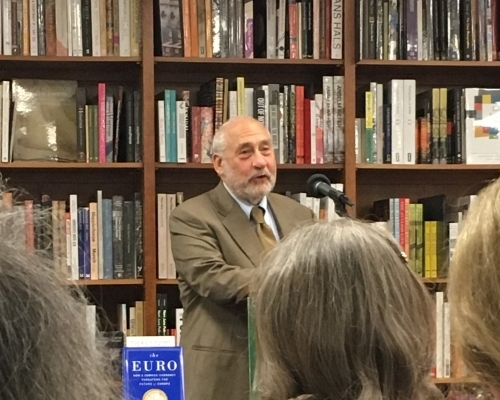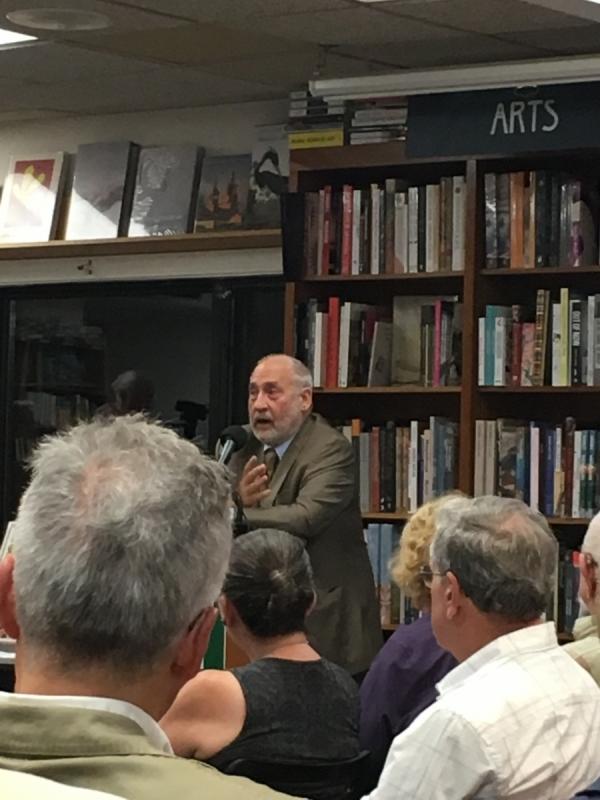On September 8th the Globalization, Economics, and Business cohort took a trip to Politics and Prose to listen to Nobel Prize winner Dr. Joseph E. Stiglitz discuss his book “The Euro: How a Common Currency Threatens the Future of Europe”.
"He had a vivacious personality, immediately telling jokes and enticing the audience. I was pleasantly surprised as I began to understand the complicated concepts he described in layman terms. Being an international affairs major, I didn’t expect to have any interest within the field of economics, and decided to choose the GEB cohort as a way of branching out, but through Dr. Stiglitz’s talk, I discovered that globalization is a key factor in economics and there are connections between nations all over the world."
- Angie Mohanty
"Having never read Joseph Stiglitz’s book “The Euro: How a Common Currency Threatens the Future of Europe”, I wasn’t sure exactly what to expect as I sat in the audience last Thursday, waiting for Stiglitz’s book talk to begin. After a fifteen minute Uber ride to Poetry and Prose, a charming bookstore with a quaint coffeehouse on the lower level, the GEB girls convened to listen to a world-renown economist. We were luckily to have gotten seats early, since with still a half hour until the start of the talk, the room was already packed!
After listening to the introduction given to Joseph Stiglitz, to describe my first impression of him in one word, I would have to say ‘genius’. Not only is Stiglitz a professor at Columbia University, a former senior vice president and chief economist of the World Bank, and a former member and chairman of the Council of Economic Advisers, but he also is a recipient of the Nobel Memorial Prize in Economic Sciences. As someone who is not incredibly well versed in the current issues surrounding the Euro, I was a bit concerned that I would be unable to follow exactly what such an intelligent economist was trying to convey in his book talk. However, it didn’t take long for me to realize that Professor Stiglitz’s language was completely comprehendible, even for the average person. This is something that I think was appreciated by a vast majority of people, because while I’m sure the audience was filled with many economics enthusiasts, there were many individuals who probably came to learn new things about a topic they didn’t know much about. For this reason, I admire Joseph Stiglitz’s decision to give a public book talk. It really speaks to his passion for his area of expertise, since he sees the value in spreading his knowledge. Hearing Stiglitz talk, it was so evident that he was incredibly passionate about the issues of the Euro. It was during the closing question period that I noticed just how interested he was in what he spoke about. An individual would ask a question, and on top of answering the question at hand, Joseph Stiglitz would go off on a tangent about something that the question made him think of. For example, one man asked about Brexit’s effect on the Euro, and Stiglitz addressed the man’s question with great detail and enthusiasm, and further went on to speak about the positives and negatives of introducing, to Europe, an economic system similar to that of the United States or Canada. Further, he would make little jokes during his lecture, which made the talk engaging and fun to listen to.
By the end of Joseph Stiglitz’s talk, I was very interested in his theory about the Euro, and I was happy to be leaving Poetry and Prose with a lot more knowledge about current economic issues in Europe than I had when I entered. Hearing him speak about the issues surrounding the Euro, and about the possibility of a great European downfall, I was curious to hear what Stiglitz had to say about the timeline of future events for Europe’s economy. I stood in line to ask Professor Stiglitz when he believes the structural issues of the Euro’s implementation will become completely unavoidable by European nations. While I understand his concerns with the Euro, I would like to know what he sees the level of urgency of these problems to be. How much time does the European economy, and the rest of the world for that matter, have under its current system before massive turmoil occurs? Unfortunately, he ran out of time for questions, but I actually did have a chance to discuss my question with a member of the audience who approached me to ask what question I had for the economist. It was interesting to have the opportunity to speak with a member of the community about economics, and it made me feel like I had really learned a great deal."
- Shannon Fitzpatrick
"I expected Joseph Stiglitz's talk at Politics & Prose to be incomprehensible to me. He's a Nobel-prize winning economist and I'm a college freshman who doesn’t keep up with current events. I still would have learned something, but not as much as I did Thursday night. I was happy to be wrong. He talked about events of the 2008 financial crisis and how the Euro played in. I valued that he delivered his ideas to us in plain English, so that anyone in his audience could understand him. To me, this meant that he cared about educating the public. I appreciated that, and enjoyed learning about events that happened during my lifetime but that I knew nothing about.
I left his talk wanting to know more. A class I'm taking in the Business School reminded me that the effects of what happened when I was in 6th grade will affect me for a significant portion of my working life, if not all of it. I've heard a bit of Mr. Stiglitz's take on things, so now it's time for me to find information elsewhere."
- Akoo Donahoe




